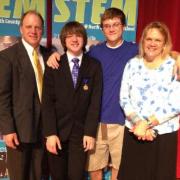Jack Andraka, the Teen Prodigy of Pancreatic Cancer
Since he won the $75,000 grand prize at Intel International Science and Engineering Fair spring 2012 age age of 15, one of the few freshman ever to do so, Jack has become a North County High School celebrity to rival any soccer star or homecoming queen. Jack Andraka created his potentially revolutionary pancreatic cancer detection tool at nearby Johns Hopkins University, though he does sometimes tinker in a small basement lab at the family’s house in leafy Crownsville, Maryland, where a homemade particle accelerator crowds the foosball table.
 Jack Thomas Andraka was born in 1997. Jack’s older brother, Luke, won $96,000 in prizes at the Intel International Science and Engineering Fair in 2010. Their father is a civil engineer. Their mother is an anesthetist. She told the Sun “… we’re not a super-athletic family. We don’t go to much football or baseball.” “Instead we have a million [science] magazines [and] sit around the table and talk about how people came up with their ideas and what we would do differently.”
Jack Thomas Andraka was born in 1997. Jack’s older brother, Luke, won $96,000 in prizes at the Intel International Science and Engineering Fair in 2010. Their father is a civil engineer. Their mother is an anesthetist. She told the Sun “… we’re not a super-athletic family. We don’t go to much football or baseball.” “Instead we have a million [science] magazines [and] sit around the table and talk about how people came up with their ideas and what we would do differently.”
Jack Andraka used what he found through Google searches and free online science journals to develop a plan and a budget. Jack contacted about 200 people including researches at Johns Hopkins University and the National Institutes of Health with a proposal to work in their labs. He got 199 rejections and then finally got an acceptance from Dr. Anirban Maitra, Professor of Pathology, Oncology and Chemical and Biomolecular Engineering at Johns Hopkins School of Medicine. It’s at Maitra’s lab where Jack worked daily after school, on weekends and over holidays until he developed his test.
This 15-year-old “Edison of our times,” as Andraka’s Hopkins mentor has called him, wears red Nikes carefully coordinated with his Intel T-shirt. His shaggy haircut is somewhere between Beatles and Bieber. Maitra — believes that the dipstick should ultimately be modified to identify other flag-raising cancer proteins along with mesothelin — has made clear that Andraka has a lot more testing to do before publishing a peer-reviewed paper on the work, the next step. Even if all goes well, the product probably wouldn’t be marketed for a decade or so. However, Jack has pioneered the research in a new direction that worth further study.
Why did a 15-year-old beat out billion-dollar pharmaceutical companies with his diagnostic test? Perhaps as a young person with no experience, he hadn’t yet learned what everyone else in the industry “knew couldn’t be done.” Certainly, it was in no small part because Anirban Maitra gave him a chance. Not to mention that Jack had an idea and went out and gave it a try.
Think about Jack Andraka the next time you hear that something can’t be done, someone asks you to help out with his project, you receive numerous rejections (close to 200 in Jack Andraka’s case) or you’re hesitating to give one of your ideas a shot. Also, keep in mind that you don’t necessarily need a giant team, billions of dollars in resources or even more than 15 years of life experience to do something amazing.
Read More
Jack Andraka, the Teen Prodigy of Pancreatic Cancer
Jack Andraka (wikipedia)
